Posts by GDB
One of my favorite storytelling tropes is the found family. I thought Mad Max: Fury Road was one of the best movies of the past decade. I still unironically enjoy pirate stories. Badass ladies are badass.
So Seafire by Natalie C. Parker is checking a lot of my boxes.
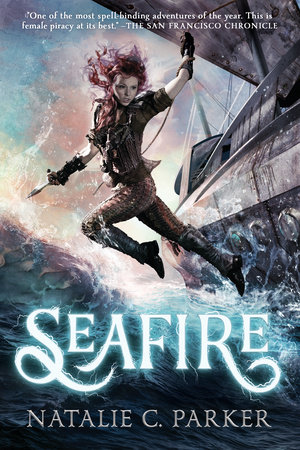 Seafire is a swashbuckling dystopia following Caledonia Styx, a young woman on the run from a powerful warlord Aric Athair. After her family is ambushed and murdered by a crew of the warlord’s Bullets — loyal soldiers groomed from childhood for violence and controlled by mandatory drug addiction — Caledonia is forced to turn from refugee to pirate captain, sailing the high seas with her all-female crew of rebels and renegades aboard the Mors Navis, taking the fight to Aric’s forces by targeting his fleet of floating garden barges where the flowers that fuel his drug production are grown.
Seafire is a swashbuckling dystopia following Caledonia Styx, a young woman on the run from a powerful warlord Aric Athair. After her family is ambushed and murdered by a crew of the warlord’s Bullets — loyal soldiers groomed from childhood for violence and controlled by mandatory drug addiction — Caledonia is forced to turn from refugee to pirate captain, sailing the high seas with her all-female crew of rebels and renegades aboard the Mors Navis, taking the fight to Aric’s forces by targeting his fleet of floating garden barges where the flowers that fuel his drug production are grown.
But when one of Aric’s Bullets tries to defect to Caledonia’s side, saving the life of her best friend in the process, the captain’s survival tactics and deep-seated beliefs are called into question. On the one hand, he represents everything she and her crew despise, and keeping him aboard could mean all of their deaths; after all, trusting a Bullet was what led to her family’s deaths. On the other, if he’s telling the truth, he might hold the key to taking down Aric once and for all — and to Caledonia being reunited with the little brother that she thought she’d already lost long ago.
Read more aboard the Mors Navis
Tags: book, dystopian, found family, girl power, Natalie C. Parker, nautical, pirates, review, shelf life, story, swashbuckling
Posted in Shelf Life: Book Reviews |
This is kind of a hard review to write, just because I’ve already written it once already, so now I have to try not to repeat myself. Part of me just wants to drop a link here to my review of the first book in the series, The Grey Bastards, and leave it at that. And while I won’t actually be that lazy, I will go ahead and link that first review — check it out here, if you’ve a mind.
Honestly, I’m not sure at first what to say here besides: Did you read The Grey Bastards? Did you like it? Because this is more The Grey Bastards: more sprawling storylines weaving together in unexpected ways; more tough-as-nails, foul-mouthed, badass characters with flexible moral compasses; more unapologetic grit and grime and gut-strewing; more peeks into the nooks and crannies of a unique and beautifully built but cruelly unforgiving world; more sex; more violence; and more robust bacon flavor.
Also, to lift another similarity from the first review, more quick notes worth disclosing. First off, spoilers for the first Bastards book, obviously, so go read that if you haven’t yet before you read this. Second, for the sake of transparency, Jonathan French is still a friend of ours — someone we thanked as a mentor figure in our own debut self-published novel, and someone whose work we’ve been promoting at conventions and on social media and such as Bastards ambassadors (aka “ambastards”). We got advanced reader copies of The True Bastards about a month before the book goes/went on sale to the public, depending on when you’re reading this.
Take all of that into consideration if you want — but also know that, like The Grey Bastards before it, we don’t need no incentives to tell people that this book is damn good. This shit is my jam, and I was gonna read it and love it whether or not the author knows what my face looks like. The fact that I got to do it a month ahead of most other people was just a nice bonus and an incidental early birthday present.
Got all that? Cool, back the fun part.
Read to the end, ya bastard!
Tags: book, fantasy, Jonathan French, orcs, review, shelf life, story
Posted in Shelf Life: Book Reviews |
Judge this book by its cover. I did, and I wasn’t disappointed.
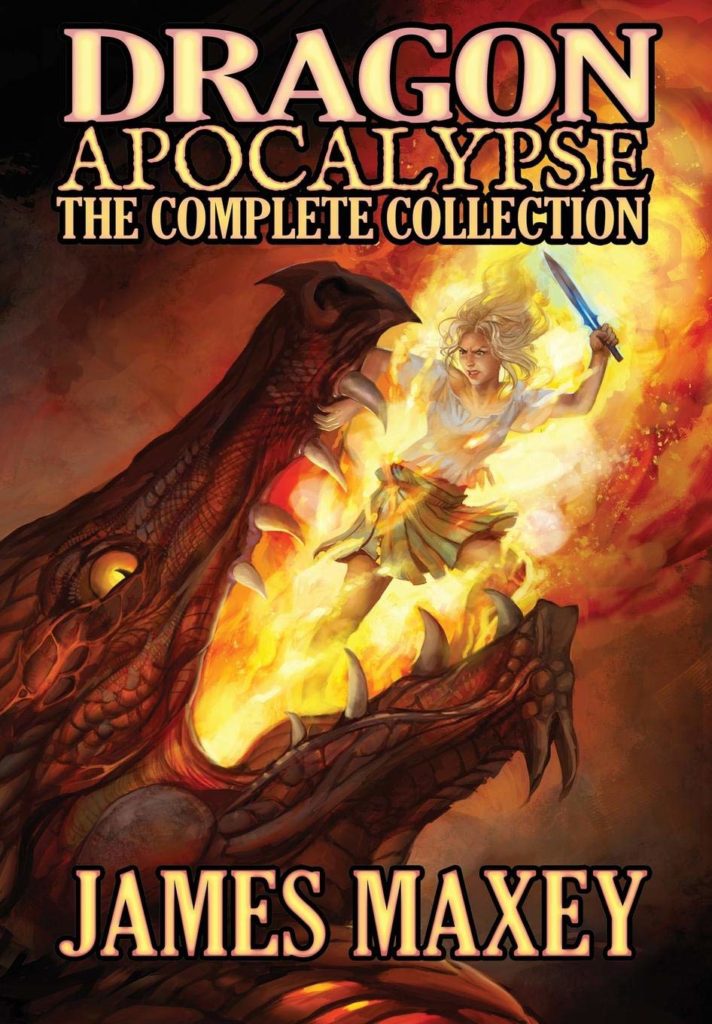 Dragon Apocalypse: The Complete Collection by James Maxey is a thick-as-a-brick compilation of four hack-n-slash action fantasy novels (plus the original short story that inspired them): Greatshadow, Hush, Witchbreaker, and Cinder (plus “Greatshadow: Origins”).
Dragon Apocalypse: The Complete Collection by James Maxey is a thick-as-a-brick compilation of four hack-n-slash action fantasy novels (plus the original short story that inspired them): Greatshadow, Hush, Witchbreaker, and Cinder (plus “Greatshadow: Origins”).
Just to be thorough, I did a quick image search of each individual novel’s cover art, and my initial thesis still holds up. Badass lady jumping down a dragon’s throat, small woman with big hammer versus ice dragon in a frozen wasteland, dragon attacking ship on a storm-wracked sea, they all check out. And they’re all pretty good indicators of what kinds of stories to expect on the following pages.
Read to the end (of the world)
Tags: anthology, book, cinder, fantasy, greatshadow, hush, indie author, infidel, James Maxey, review, shelf life, story, witchbreaker
Posted in Shelf Life: Book Reviews |
I know it’s gauche to start an essay with a definition, but bear with me for a second, I promise it’s relevant.
Pulp fiction is technically defined by how it’s published, in magazines made with inexpensive wood pulp paper, priced cheaply to be sold and read in bulk. Sometimes this “quantity over quality” approach applied to the stories themselves, but sometimes it didn’t; pulp fiction, like all fiction, is only as good or as shoddy as the author writes it.
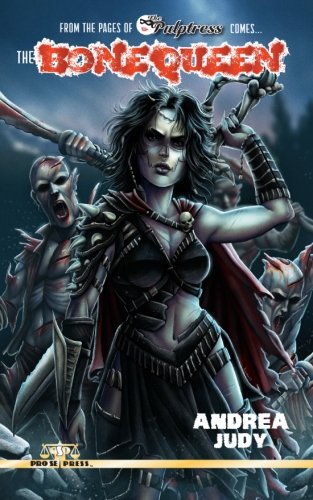
But beyond the technicalities of publishing, pulp fiction also developed a sort of overarching genre definition based on some recurring themes that tended to crop up in the stories again and again, regardless of categories like fantasy, noir, horror, etc. — namely, big, bombastic heroes squaring off against sinister, mysterious villains in dangerous, exotic locales, featuring beautiful women of both the damsel and the deadly variety.
All of this is to underscore that pulp fills a certain niche in fiction, and that The Bone Queen by Andrea Judy (disclaimer: another indie author friend of ours for several years now) falls squarely into this niche, so the answer to the question “But is it good, though?” will vary depending on where a reader stands in relation to said niche.
Do I like it? Yeah, I think it’s pretty good. The narrative isn’t deep or particularly nuanced; it doesn’t ask any tough questions or make many thoughtful moral arguments; and the fact that it’s an origin story for a character named “the Bone Queen” means you kind of know where the book is going to end up, more or less, from the word “go.” But it’s an entertaining trip getting there, straightforward and simple and fun, and full of rotten, visceral imagery, dark magic, and bone-crunching (in the most literal sense possible) action.
Read down to the bone
Tags: Andrea Judy, book, fantasy, indie author, pulp, Pulptress, review, shelf life, story, supernatural, zombie
Posted in Shelf Life: Book Reviews |
Hot take: Orcs are bitchin’.
Big, tough, ripped, brutal badasses, for years they’ve been the go-to choice in fantasy for evil power players in need of intimidating mooks. More recently, modern fantasy has granted them a PR boost, both in reimaginings and in original stories. Black-and-white morality is out of fashion, shades of gray are in, and this gives orcs the opportunity to take the powerful, intimidating, dangerous image they’ve cultivated through decades of villain status and turn it toward nobler (or at least more sympathetic) pursuits.
No character is more interesting than the reformed villain. Put simply, orcs are the bad boys of the fantasy world.
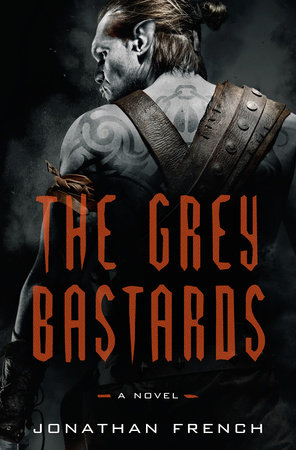 And the warhog-riding half-orc bikers of The Grey Bastards are the bad boys (and girl) of the orc world.
And the warhog-riding half-orc bikers of The Grey Bastards are the bad boys (and girl) of the orc world.
Mix Sons of Anarchy with Shadow of Mordor and you’ll get a world similar to the Lot Lands of Jonathan French’s The Grey Bastards, where gangs of orc-human hybrids ride monstrous swine called barbarians as they patrol their anarchic wasteland, keeping the humans of Hispartha safe on one side by fending off the raiding parties of full-blooded orcs that routinely probe their lands from the other.
Although, confession, I don’t know how accurate this analogy still is when it comes to quality, because I’ve never actually seen Sons of Anarchy or played Shadow of Mordor. I’ve heard pretty good things about both, though, which makes me think the comparison still holds up. Because I have read The Grey Bastards, and yeah, it’s good. It’s really, really good.
Read in the saddle, continue on the hog!
Tags: book, fantasy, indie author, Jonathan French, orcs, review, shelf life, story
Posted in Shelf Life: Book Reviews |
Like the 500 million people who downloaded the thing (according to Venture Beat) and its 21 million daily users (according to SurveyMonkey), I am a little bit fascinated by Pokemon GO: the social aspect, the use of augmented reality, and the incentive to get out and wander around new and/or familiar places. It’s kind of amazing to see how many people this little free-to-play game is bringing together through a shared interest, giving folks who might otherwise have trouble socializing an easy ice breaker and an excuse to go meet people.
But one of the most interesting discussion topics that’s arisen from this Pokemon resurgence has been “This is a cool idea, but you know what I’d really love to play? (Something else) GO.”
That “something else” potential grabbed my attention. People in my office were speculating on how you would play Harry Potter GO. People I knew on Facebook were pining over mockups of Fatal Frame GO. An idea for how to make Persona GO viable came to me and still refuses to leave.
It was around this time that I realized just how versatile this GO game template could be for a number of different IPs, franchises, and fandoms beyond Pokemon — how easily a lot of other ideas could plug into this same app and get fans out and about, meeting new people through a shared AR game.
So why not explore that hypothetical rabbit hole a bit further?
GO read more
Tags: apps, AR, augmented reality, Fatal Frame GO, Ghostbusters GO, GO games, Harry Potter GO, Legend of Zelda GO, Persona GO, Pokemon, Pokemon GO, thoughts, video games
Posted in Off The Shelf: Media & Miscellany, Video Games |
Ever notice how in any movie, show, or game with singing, if the villain gets a song, it’s the best one on the soundtrack? Makes sense; everyone knows villains are more interesting than heroes, which means so are their tastes in music.
Know what else makes sense? Combining all the best villain songs into one evil, awesome soundtrack. Putting this album together has been a project I’ve been meaning to get to for a while now. And since it’s almost Halloween, I figured I’d also share it here so others can go out and do likewise.
So partly in the spirit of the holiday, and partly because it’s just a good idea anytime of the year, here’s my Ultimate (So Far) Villain Song Soundtrack. I reserve the right to come back and add to it as new villains with new musical accompaniment arise in the stuff I watch and play.
Read on. Mwaha. Mwahahahaha.
Tags: halloween, music, playlist, songs, soundtrack, villains
Posted in Off The Shelf: Media & Miscellany, TV and Movies, Video Games |
It’s been a while since my last review, in part because it’s been a while since the last time I read a book and came away with enough to say about it to warrant writing it up, but in bigger part because I’ve been working harder on a book of my own. My wife and I have recently finished writing our first full-length, publishable novel together and are now in the process of editing so we can start looking for an agent and a publisher. Between that and my new job, my blog’s fallen down the list of things toward which my literary efforts need to be put.
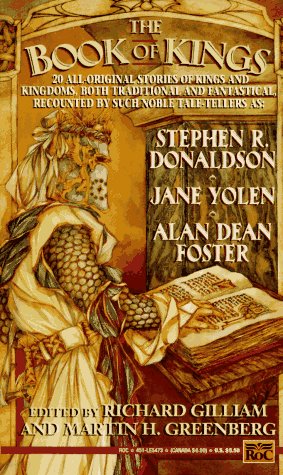 During the tail end of writing this novel, though, I pulled down The Book of Kings from our shelves, a collection of “20 all-original stories of kings and kingdoms, both traditional and fantastical, recounted by such noble tale-tellers as (a bunch of names that probably look at least somewhat familiar).” Our own story is largely centered around the activities of a royal family and the assassin who’s living in their midst, so I thought it would be a good source of inspiration and motivation while I already had kings and their doings on the brain.
During the tail end of writing this novel, though, I pulled down The Book of Kings from our shelves, a collection of “20 all-original stories of kings and kingdoms, both traditional and fantastical, recounted by such noble tale-tellers as (a bunch of names that probably look at least somewhat familiar).” Our own story is largely centered around the activities of a royal family and the assassin who’s living in their midst, so I thought it would be a good source of inspiration and motivation while I already had kings and their doings on the brain.
And as it turns out, I was right.
Read more; your king commands it
Tags: book, Martin H. Greenberg, paperback, review, Richard Gilliam, shelf life, short stories, story, The Book of Kings
Posted in Shelf Life: Book Reviews |
Starting a piece of writing can sometimes be one of the hardest parts of writing it, even for a book review, and especially for this one. I’ve been reading Jacqueline Carey’s adventures in Terre d’Ange for years now, starting with Kushiel’s Dart and just recently wrapping up Naamah’s Blessing. And I can honestly say that the nine books that comprise these three trilogies are among the best fantasy available today as well as nine of my all-time favorite books I’ve ever read. Ask me a question about some aspect of them and I can start rambling for an hour, but how do you pick a spot to begin at with this much to talk about?

The first two-thirds of the awesome.
I’ve been meaning to review the Kushiel and Naamah books since I started this blog, but covering just one book on its own is no good – by now, they’ve all melted into one massive and epic storyline in my head spanning multiple generations of characters. Also, it’s been a while since I finished Kushiel’s Dart, and like most series, you have to start at the beginning to fully appreciate what comes afterward.
So instead of talking about a single book in the series or each one individually, I’ve decided instead to write one big ass review to cover my thoughts on the series as a whole. Call it a bittersweet celebration for my finally having finished the last book, a going away party as I finally leave Terre d’Ange behind. Also, seeing as how Ms. Carey herself recently sounded off on the feasibility of the whole shebang being adapted for screen, it’s almost timely.
Read as thou wilt
Tags: book, epic fantasy, fantasy, jacqueline carey, Kushiel's Dart, Kushiel's Legacy, Naamah trilogy, Naamah's Curse, review, shelf life, Terre d'Ange
Posted in Shelf Life: Book Reviews |
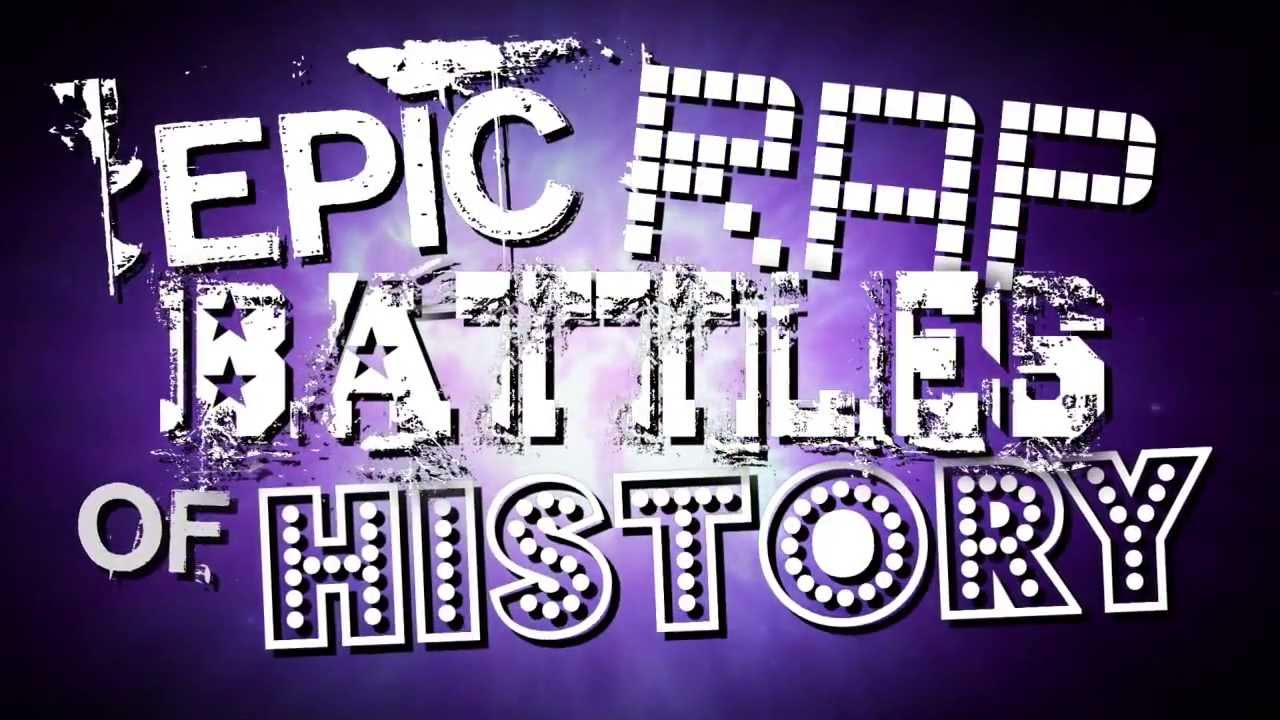
If you’ve never heard of Epic Rap Battles of History, then you’re hanging out on the wrong parts of the internet. With almost 10 million subscribers and over 1 billion views so far, ERB has become one of the most popular channels on YouTube. Even when you don’t know much about the combatants pitted against one another, they’re still fun. And when you’re already a fan of whoever’s throwing down, it’s awesome.
One of the best things about the battles is that each side gets equal quality treatment – there are never any gimme battles. Even Hitler gets a fair shot at his opponent (which is troublesome for this particular project I’m doing here, but more on that in a minute). As such, there is never a verified winner of a battle.
Until now.
Read what I’ve decided
Tags: best lines, Epic Rap Battles of History, EpicLLOYD, ERB, Nice Peter, rap battles, review, who won, who's next, YouTube
Posted in Internet Miscellany, Off The Shelf: Media & Miscellany |
Some of my all-time favorite video games are in the Shin Megami Tensei: Persona series, which I was introduced to by the excellent Persona 3. Since then, I’ve had a huge blast following the games’ casts of colorful and interesting characters while also discovering just how many demons and mythic figures I can find swimming around in my own head. This massive plethora of personas to discover and collect is obviously a huge reason why these games are so fun – in this respect, Persona is like a darker, more mythical Pokemon, only with legendary heroes and gods instead of a hundred different types of rodent and bird.
With so many different personas on display, though, it stands to reason that some will stand out more than others. Picking just one or two that are better than all others is impossible, as is picking just a single favorite. So instead, I’ve decided to narrow down the roster to just my top 10 favorite personas, explaining how and why I find them so appealing.
Read on to the truth
Tags: Faust, ItsSuperEffective, P3, P3 FES, P4, Persona, Shin Megami Tensei, Top 10
Posted in Off The Shelf: Media & Miscellany, Video Games |
(Warning: For those who like this show but haven’t caught up on Season 4 yet, or for those who want to start watching this show but haven’t gotten around to it, know that this article is gonna contain some massive spoilers. The title also contains a pretty glaring spoiler, while I’m at it. Sorry about that. No real way around that one. All titles come with a price, I suppose.
Ahem…)
I don’t watch a lot of TV, but occasionally a show will come along that demands my attention and continued interest. ABC’s Once Upon a Time is one such show. Fairytale character crossovers aren’t a new idea, but they remain a good one. I haven’t seen an attempt so far that I haven’t liked (after the second or third Shrek movie, anyway), but Once is definitely one of the better ones. And by far the biggest reason for this is the character of Rumpelstiltskin.
Read on, dearie
Tags: character, Dark One, fairy tales, Mr. Gold, Once Upon a Time, OUaT, plot twist, Robert Carlyle, Rumpel, Rumpelstiltskin, Storybrooke, TV show
Posted in Off The Shelf: Media & Miscellany, TV and Movies |
Very few fantasy fans can get away with admitting that they aren’t all that big into sweeping, high epic fantasy à la Lord of the Rings or the Pern stories or everything that Terry Brooks writes. Many non-fantasy fans, however, can point to these tales as examples of why they aren’t into fantasy. Like it or not, it’s hard not to see the latter group’s point, as a lot of high fantasy is riddled with confusing terminology, rehashed stories, and genre clichés. This is not to say that these stories are bad, per sé, just that they can easily turn off readers who aren’t in the right kind of crowd.
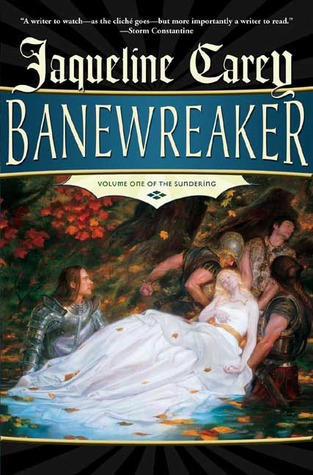 Banewreaker, the first book in Jacqueline Carey’s two-part volume The Sundering, will probably not change any opinions in this respect, then, as it’s sweeping high fantasy to the core. This, as it turns out, is both its greatest strength and its greatest weakness.
Banewreaker, the first book in Jacqueline Carey’s two-part volume The Sundering, will probably not change any opinions in this respect, then, as it’s sweeping high fantasy to the core. This, as it turns out, is both its greatest strength and its greatest weakness.
Read more about wreaked banes
Tags: banewreaker, book, epic fantasy, fantasy, jacqueline carey, paperback, review, shelf life, story, tragedy
Posted in Shelf Life: Book Reviews |
I sit with my girlfriend in a plastic booth at McDonald’s and watch as Ms. Li unwraps her McFish sandwich. She had paid for it, and for our McFood as well, with a hundred dollar bill from the early 1900s that the cashier lady had to counterfeit check twice before just about emptying the register to make the change.
Spreading the McFish paper out carefully on the fake marbling of the plastic table, Ms. Li bites open a packet of mayonnaise, which she squirts across her fried McSquare of McFish. This is followed by a full packet of grape jelly, which plurps down over the squirt of mayo and sinks through before Ms. Li replaces the McBun.
Before we leave, she’ll wrap our last two unopened McKetchup packets in a wad of about fifty McNapkins and shove them into the unseen depths of her musty purse. Right now, though, as she eats, she explains to us in her broken and confused English that she doesn’t ever go to the dentist because dentistry terrifies her. According to her, a friend or sister or cousin (I couldn’t discern which even as the story was first being told) went to the dentist once to get a tooth pulled and her gums just never stopped bleeding afterward. She eventually bled to death from the gap in her teeth, and that was enough to damn oral hygienists everywhere in Ms. Li’s eyes.
I’m not sure I entirely believe the story. I’m not sure I entirely believe anything about Ms. Li.
Read for yourself
Tags: character, Georgia, McDonalds, Ms. Li, nonfiction, old lady, story
Posted in Off The Shelf: Media & Miscellany |
Fantasy and satire are two of my favorite genres in any medium, but especially so in books. Satirical fantasy, then, holds a special place on my shelves. I grew up on Sir Terry Pratchett’s Discworld series, and desire to imitate him and his style is what led me in middle school to begin writing in earnest, for fun, and for myself rather than just for my teachers and their assignments.
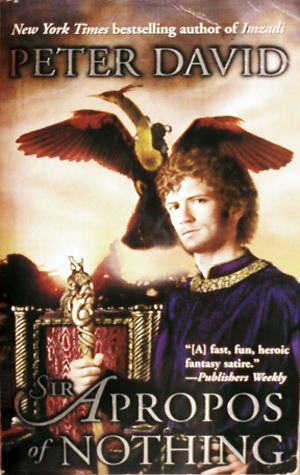 So when I picked up Sir Apropos of Nothing, I did so based on the title pun and the back-of-the-book synopsis that promised “a berserk phoenix, murderous unicorns, mutated harpies, homicidal warrior kings, and – most problematic of all – a princess who may or may not be a psychotic arsonist.” I expected another lighthearted riff on the familiar archetypes. Murderous unicorns? Unicorns are not typically described as such! Oh teehee, how unexpectedly humorous!
So when I picked up Sir Apropos of Nothing, I did so based on the title pun and the back-of-the-book synopsis that promised “a berserk phoenix, murderous unicorns, mutated harpies, homicidal warrior kings, and – most problematic of all – a princess who may or may not be a psychotic arsonist.” I expected another lighthearted riff on the familiar archetypes. Murderous unicorns? Unicorns are not typically described as such! Oh teehee, how unexpectedly humorous!
Read more about nothing
Tags: book, fantasy, paperback, peter david, review, satire, shelf life, sir apropos of nothing, story
Posted in Shelf Life: Book Reviews |
(I’m gonna go ahead and throw a disclaimer on up here: You are about to read something that deals with purportedly “erotic” subject matter. If you don’t like the sound of that word, you might wanna go elsewhere. If it’s actually-erotic things that offend you, though, you’ll be fine.)
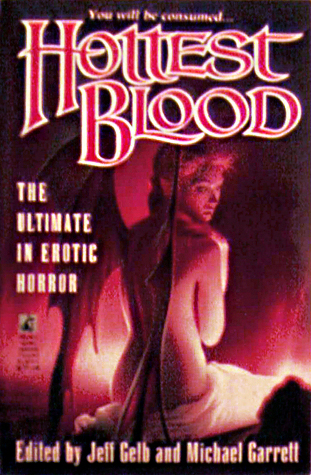 I like short story compilations because you get a variety of content that’s just as easy to breeze through if you have the time as it is to get to a stopping point and put down if you don’t. I like horror fiction because it usually involves the super-natural, which interests me, and intense emotional responses, which are almost always a good thing in writing. And I like eroticism because I am a warm-blooded human being with a pulse. However, on the whole, I do not like Hottest Blood.
I like short story compilations because you get a variety of content that’s just as easy to breeze through if you have the time as it is to get to a stopping point and put down if you don’t. I like horror fiction because it usually involves the super-natural, which interests me, and intense emotional responses, which are almost always a good thing in writing. And I like eroticism because I am a warm-blooded human being with a pulse. However, on the whole, I do not like Hottest Blood.
I wanted to, I did. Look at that cover. It’s equal amounts scary and sexy, both in completely safe, PG-13-at-most kind of ways. Unfortunately, Softcore Succubus here is both the scariest and the sexiest thing about this book
Bluntly analogized, you know that feeling you get when you come across something on the internet that disturbs and/or disgusts you, and then you learn that there’s a dedicated group of people that gets off on it? Most of the stories in this book are that feeling captured in words.
Case in point, the story “Damaged Goods” by Elizabeth Massie, which as far as I can tell is about a couple of physically abused, emotionally damaged, developmentally stunted kids somewhere around their early teens who live with a religious fringe cult being led out to a field to have sex with each other while a nameless U.S. President watches and masturbates before both kids are drowned in a river by their preacher/pimp caretaker.
Or there’s “Mr. Right” by Chris Lacher, which tells the story of a college student named Russ who has a secret fetish for the deformed women in the freak show at a nearby carnival – a fascination which leads to him getting held down and forcibly raped by a group of unwashed subhuman mutants, which the detailed descriptions make sure you understand are completely revolting to all five senses. The story ends with him being dumped out behind the fairgrounds while a small, legless girl happily informs him that this is how all carnival workers reproduce, and he can look forward to seeing his own mutant rape-spawn in the show next year.
Or there’s “Abuse” by Matthew Costello, which simply shows us how the arrest of a Peewee Herman surrogate goes down in an adult movie theater before ending with another man jerking off with the cold, dry, severed hand in his pocket as he contemplates getting a new one to replace it.
The tone of these three are pretty much par for the course for the rest of the book: thoroughly disturbing, and sex is involved, but the disturbing feeling stems from revulsion rather than fear, and the sex bits are so far on the other end of the spectrum from erotic that it feels like the authors are trying to punish their readers for even expecting to be aroused in any way.
Of course, I said myself earlier that intense emotional responses are “almost always a good thing in writing.” By that merit alone, this book technically succeeds; in fact, if it had billed itself as shock fiction instead of erotic horror, I’d begrudgingly give it a medal in its class. The “aw, what the hell?!” moments are not as artistically executed as, say, a Chuck Palahniuk read, and they tend not to have as much depth to them, but strictly in terms of making you wish that you could unread words, they get the job done.
But that isn’t the job that Hottest Blood was hired to do, and that’s not what it put on its resume. It said it was going to “heat the blood and chill the mind,” and promised that “terror never felt this sexy!” It would have been more appropriate to say that “sex never felt this terrible.”
All of that said, if you abandon any hope of seeing anything resembling erotica or horror (scary horror, anyway), there are a few stories in here that are decent reads – mostly because they try to say something with their subject matter rather than use it to see how thoroughly they can ruin the idea of sex for the reader. To give a few quick nods of approval:
- Nancy Holder’s “I Hear the Mermaids Singing,” which opens the anthology, is a dark and modern re-imagining of “The Little Mermaid” that brutally points up the drawbacks to throwing away your whole life and family in order to pursue someone that you know nothing about outside of a few fleeting glimpses and lustful inner fantasies.
- J.L. Comeau’s “Black Cars” is the narrative of a high-class chauffeur as he tells his passenger an increasingly mysterious story about a couple of his regular customers, culminating in a creepy twist payoff that, in retrospect, actually makes it count as a legitimate horror story, and a decently gripping one at that.
- And “Safe at Home” by Steve and Melanie Tem, while decidedly and disturbingly unsexy, at least has good reason to be; it’s a short character study of a young woman who’d been molested as a child, and the lasting and complex psychological damage resulting thereof that prevents her from having any normal social life or relationships, even with someone whom she legitimately likes, someone who knows what’s happened and sincerely cares for her.
So for the handful of intriguing stories that don’t make you quit (or wish you had) mid-read out of revolted disappointment, I can’t completely condemn Hottest Blood. If you want to test your own threshold for repulsion but are understandably hesitant to use online image searches to this end, I heartily recommend it.
If you are legitimately turned on by the idea of a man eating a woman alive and then gestating her alien spawn inside his own bloated body until his head detaches and crawls away (“How Deep the Taste of Love,” John Shirley), I suppose I still heartily recommend it, though I do so from a safe distance.
If you want to read one of the few stories involved that aren’t horrible, I heartily recommend trying to find them on their own somewhere else first.
But if you want “the ultimate in erotic horror,” stay the hell away. Softcore Succubus is a trap.
Tags: book, erotic, horror, hottest blood, jeff gelb, michael garrett, paperback, review, shelf life, short stories
Posted in Shelf Life: Book Reviews |
(Since I want to keep this blog with some sort of momentum but have been lacking the time to do anything about it for the past few weeks, enjoy this book review from an earlier, temporary blog that I had going for a class, in which I pretended I was a dragon with a computer, edited to remove any reference to me being a dragon with a computer, as I am in actuality not one of those.)
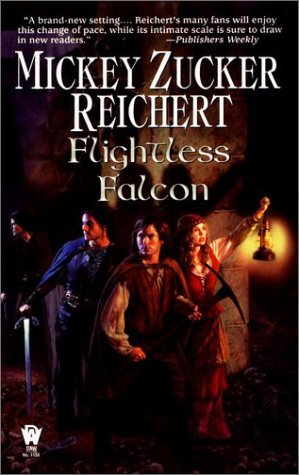 Flightless Falcon is a light DAW fantasy by Mickey Zucker Reichert that first came out in paperback in July of 2001. Set in your typical fantasy land – lightly coated in magic but sans any fantastical creatures such as dragons, elves, dwarves, and the like – it follows the sad, luckless exploits of an ex-miner named Tamison made useless after a cave in kills his father and brother and leaves him trapped deep in the mine for a few days.
Flightless Falcon is a light DAW fantasy by Mickey Zucker Reichert that first came out in paperback in July of 2001. Set in your typical fantasy land – lightly coated in magic but sans any fantastical creatures such as dragons, elves, dwarves, and the like – it follows the sad, luckless exploits of an ex-miner named Tamison made useless after a cave in kills his father and brother and leaves him trapped deep in the mine for a few days.
Read more about falcons and their flightlessness
Tags: book, fantasy, flightless falcon, mickey zucker reichert, paperback, review, shelf life
Posted in Shelf Life: Book Reviews |
I keep realizing, forgetting, and re-realizing that the first step to any writing project is forcing yourself to start.
I love writing, but even after more than a decade of doing it for both work and fun, I still have to drag myself to the page or screen & force my hands to move at first. I’m not sure why – maybe because writing is an industrious hobby and I default to leisure when left otherwise unemployed. Maybe because the acts of creation and production so impress me that to begin either of them myself on any scale feels, for a moment at least, like a grand undertaking, the beginning of a long journey. Maybe because my perfectionist outlook tends toward the nitpicky at times, and so commencing a thing grates a bit when there is always so much more that I could do to prepare first.
Read more rambling
Tags: effort, ramble, story, thoughts, writing
Posted in Off The Shelf: Media & Miscellany, Writing |
 Seafire is a swashbuckling dystopia following Caledonia Styx, a young woman on the run from a powerful warlord Aric Athair. After her family is ambushed and murdered by a crew of the warlord’s Bullets — loyal soldiers groomed from childhood for violence and controlled by mandatory drug addiction — Caledonia is forced to turn from refugee to pirate captain, sailing the high seas with her all-female crew of rebels and renegades aboard the Mors Navis, taking the fight to Aric’s forces by targeting his fleet of floating garden barges where the flowers that fuel his drug production are grown.
Seafire is a swashbuckling dystopia following Caledonia Styx, a young woman on the run from a powerful warlord Aric Athair. After her family is ambushed and murdered by a crew of the warlord’s Bullets — loyal soldiers groomed from childhood for violence and controlled by mandatory drug addiction — Caledonia is forced to turn from refugee to pirate captain, sailing the high seas with her all-female crew of rebels and renegades aboard the Mors Navis, taking the fight to Aric’s forces by targeting his fleet of floating garden barges where the flowers that fuel his drug production are grown.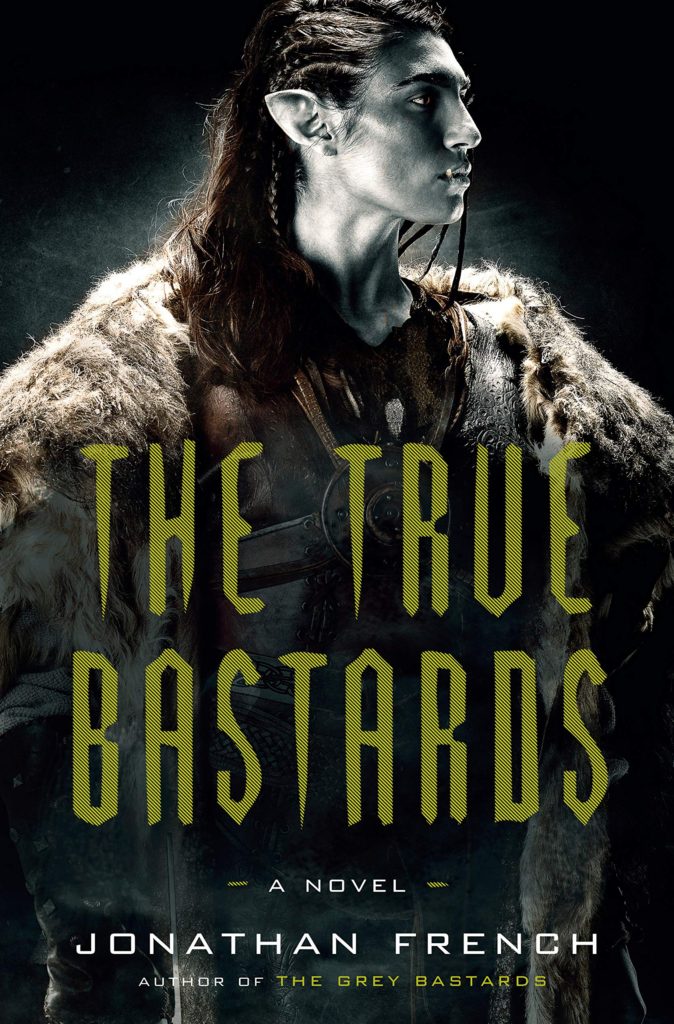
 Dragon Apocalypse: The Complete Collection by James Maxey is a thick-as-a-brick compilation of four hack-n-slash action fantasy novels (plus the original short story that inspired them): Greatshadow, Hush, Witchbreaker, and Cinder (plus “Greatshadow: Origins”).
Dragon Apocalypse: The Complete Collection by James Maxey is a thick-as-a-brick compilation of four hack-n-slash action fantasy novels (plus the original short story that inspired them): Greatshadow, Hush, Witchbreaker, and Cinder (plus “Greatshadow: Origins”). But beyond the technicalities of publishing, pulp fiction also developed a sort of overarching genre definition based on some recurring themes that tended to crop up in the stories again and again, regardless of categories like fantasy, noir, horror, etc. — namely, big, bombastic heroes squaring off against sinister, mysterious villains in dangerous, exotic locales, featuring beautiful women of both the damsel and the deadly variety.
But beyond the technicalities of publishing, pulp fiction also developed a sort of overarching genre definition based on some recurring themes that tended to crop up in the stories again and again, regardless of categories like fantasy, noir, horror, etc. — namely, big, bombastic heroes squaring off against sinister, mysterious villains in dangerous, exotic locales, featuring beautiful women of both the damsel and the deadly variety. And the warhog-riding half-orc bikers of The Grey Bastards are the bad boys (and girl) of the orc world.
And the warhog-riding half-orc bikers of The Grey Bastards are the bad boys (and girl) of the orc world. During the tail end of writing this novel, though, I pulled down The Book of Kings from our shelves, a collection of “20 all-original stories of kings and kingdoms, both traditional and fantastical, recounted by such noble tale-tellers as (a bunch of names that probably look at least somewhat familiar).” Our own story is largely centered around the activities of a royal family and the assassin who’s living in their midst, so I thought it would be a good source of inspiration and motivation while I already had kings and their doings on the brain.
During the tail end of writing this novel, though, I pulled down The Book of Kings from our shelves, a collection of “20 all-original stories of kings and kingdoms, both traditional and fantastical, recounted by such noble tale-tellers as (a bunch of names that probably look at least somewhat familiar).” Our own story is largely centered around the activities of a royal family and the assassin who’s living in their midst, so I thought it would be a good source of inspiration and motivation while I already had kings and their doings on the brain.


 So when I picked up Sir Apropos of Nothing, I did so based on the title pun and the back-of-the-book synopsis that promised “a berserk phoenix, murderous unicorns, mutated harpies, homicidal warrior kings, and – most problematic of all – a princess who may or may not be a psychotic arsonist.” I expected another lighthearted riff on the familiar archetypes. Murderous unicorns? Unicorns are not typically described as such! Oh teehee, how unexpectedly humorous!
So when I picked up Sir Apropos of Nothing, I did so based on the title pun and the back-of-the-book synopsis that promised “a berserk phoenix, murderous unicorns, mutated harpies, homicidal warrior kings, and – most problematic of all – a princess who may or may not be a psychotic arsonist.” I expected another lighthearted riff on the familiar archetypes. Murderous unicorns? Unicorns are not typically described as such! Oh teehee, how unexpectedly humorous! I like short story compilations because you get a variety of content that’s just as easy to breeze through if you have the time as it is to get to a stopping point and put down if you don’t. I like horror fiction because it usually involves the super-natural, which interests me, and intense emotional responses, which are almost always a good thing in writing. And I like eroticism because I am a warm-blooded human being with a pulse. However, on the whole, I do not like Hottest Blood.
I like short story compilations because you get a variety of content that’s just as easy to breeze through if you have the time as it is to get to a stopping point and put down if you don’t. I like horror fiction because it usually involves the super-natural, which interests me, and intense emotional responses, which are almost always a good thing in writing. And I like eroticism because I am a warm-blooded human being with a pulse. However, on the whole, I do not like Hottest Blood. Flightless Falcon is a light
Flightless Falcon is a light 
